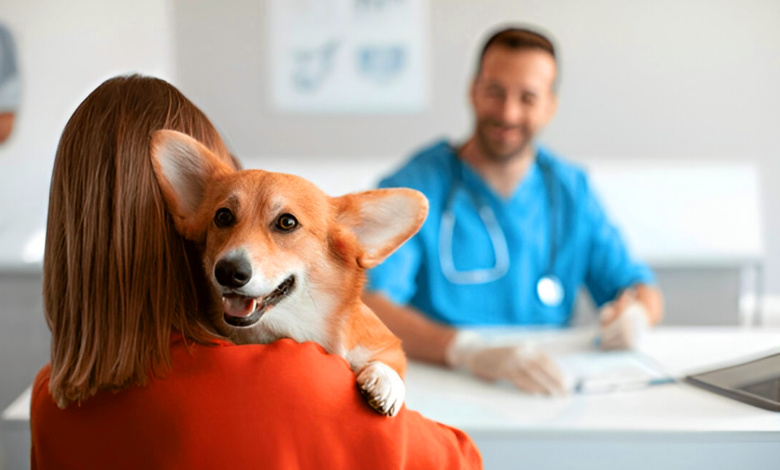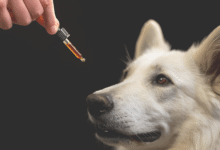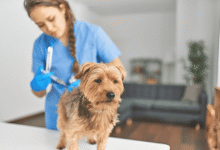
Pet Healthcare in the UK: Everything Owners Need to Know
Owning a pet is a wonderful experience, but it comes with a great deal of responsibility. In the UK, pet owners are fortunate to have access to a comprehensive network of veterinary care.
Owning a pet is a wonderful experience, but it comes with a great deal of responsibility. In the UK, pet owners are fortunate to have access to a comprehensive network of veterinary care, companion animal insurance options, and preventive treatments designed to keep their beloved animals happy and healthy. Whether you have a dog, cat, rabbit, bird, or exotic animal, understanding the essentials of care can help prevent illness, manage costs, and ensure a high quality of life for your furry (or scaly) friend.
From regular animal doctor check-ups and vaccinations to dental care, parasite control, and emergency treatments, there are many aspects to consider when looking after a pet’s health. Additionally, the rising costs of veterinary treatments make companion animal insurance a valuable investment. In this guide, we’ll cover everything UK pet owners need to know about caring for their pets, preventing common illnesses, and making informed decisions about their pet’s care.
Regular Vet Check-Ups: The Foundation of Good Pet Health
Taking your pet for regular veterinary check-ups is one of the most important things you can do to keep them healthy. Just like humans, animals can develop illnesses that may not be immediately visible. Pets, especially cats and some dog breeds, have a natural instinct to hide signs of discomfort, making routine doctor visits essential for early detection of diseases, infections, and other concerns. Regular check-ups allow your doctor to monitor your pet’s overall health, catch problems early, and offer preventive care before conditions become serious or costly.
How Often Should You Take Your Pet to the Vet?
The frequency of animal doctor visits depends on your pet’s age, species, and overall condition. Below are general guidelines:
- Puppies & Kittens – Every 3–4 weeks until they are about 4–6 months old to ensure they receive their vaccinations, deworming treatments, and assessments.
- Adult Dogs & Cats (1–7 years old) – At least once a year for a general check-up, vaccinations, and parasite control. If your companion animal has any ongoing medical conditions, they may require more frequent visits.
- Senior animals (7+ years old) – Every 6 months is ideal since older companion animals are more prone to arthritis, dental disease, kidney problems, and other age-related conditions.
- Small Pets (Rabbits, Guinea Pigs, Hamsters, etc.) – Every 6–12 months. Rabbits, for example, are particularly prone to dental disease and gut issues that can develop silently.
- Birds & Reptiles – At least once a year. These animals are experts at hiding symptoms of illness, so routine checks are crucial.
What Happens During a Routine doctor Check-Up?
A standard veterinary check-up is more than just a quick look-over—it’s a thorough assessment of your pet’s overall and well-being. Here’s what a vet typically checks during an appointment:
Physical Examination
The vet will conduct a nose-to-tail check, looking for any visible abnormalities. This includes:
✔ Eyes, ears, and mouth – Checking for infections, redness, discharge, or dental issues.
✔ Skin & coat – Examining for signs of allergies, fleas, ticks, lumps, or infections.
✔ Heart & lungs – Listening for irregular heartbeats, heart murmurs, or breathing difficulties.
✔ Weight & body condition – Ensuring your companion animal is at a healthy weight and not overweight or underweight.
Dental Health Check
Dental disease is one of the most common yet overlooked health problems in pets. Vets will examine your pet’s teeth and gums for signs of tartar buildup, gingivitis, or infections. If left untreated, poor dental hygiene can lead to serious infections affecting vital organs like the heart and kidneys.
Vaccination Updates
If your companion animal is due for a vaccination booster, the animal doctor will administer it during the check-up. Vaccinations protect against deadly diseases such as parvovirus, distemper, feline herpesvirus, and myxomatosis in rabbits.
Parasite Control (Fleas, Ticks, Worms)
Even if your companion animal is primarily indoors, they are still at risk of fleas, ticks, and worms. The animal doctor will recommend monthly flea and worm treatments based on your pet’s lifestyle. For example, dogs that drink from puddles or rivers are at higher risk of lungworm, which can be fatal if not treated.
Blood Tests (If Necessary)
For senior animals or those with existing conditions, the animal doctor may recommend blood tests to check for underlying problems like kidney disease, diabetes, or liver issues. Blood tests can reveal early-stage illnesses that may not yet be showing symptoms.
Nutritional & Exercise Advice
Vets will assess your companion animal diet and activity levels, offering guidance on the best nutrition for their breed, age, and medical needs. They may suggest weight management plans if your companion animal is overweight, as obesity increases the risk of diabetes, joint problems, and heart disease.
Why Regular Doctor Visits Are Crucial
Many pet owners wait until their animal is visibly sick before visiting a animal doctor, but by then, the condition may already be advanced. Regular check-ups help with:
✔ Early Detection of Illnesses – Finding diseases in the early stages improves treatment success rates.
✔ Prevention is Better Than Cure – Vaccinations, parasite control, and dental care help avoid costly medical problems later.
✔ Better Quality of Life – Pets that receive regular doctor care tend to live longer, healthier lives.
How Much Does a doctor Check-Up Cost in the UK?
The cost of a routine animal doctor visit varies depending on the clinic and location:
💰 Standard consultation fee – £30 to £60
💰 Annual vaccinations – £40 to £70
💰 Flea/worm treatments – £10 to £20 per month
💰 Dental cleaning – £150 to £400 (if needed)
Many animal clinics offer care plans where you pay a monthly fee (e.g., £10-£20) to cover check-ups, vaccinations, and flea/worm treatments.
How to Find a Good Vet in the UK
Choosing the right animal doctor is crucial for your companion animal’s health. Consider:
✔ Accreditation – Look for a Royal College of Veterinary Surgeons (RCVS) accredited practice.
✔ Emergency Services – Does the clinic offer out-of-hours emergency care?
✔ Reviews & Recommendations – Check online reviews and ask fellow pet owners.
✔ Location & Availability – A animal doctor close to home is ideal for emergencies.
Vaccinations: Keeping Your Pet Safe
Vaccinations are a crucial part of companion animal care, protecting your companion animal from deadly diseases. In the UK, certain vaccinations are strongly recommended or even required.
Common Vaccinations for Dogs
- Core Vaccines:
- Canine Parvovirus
- Distemper
- Hepatitis
- Leptospirosis
- Non-Core Vaccines (Recommended for Some Dogs):
- Kennel Cough (if attending doggy daycare, kennels, or training classes)
- Rabies (if traveling abroad under the companion animal Travel Scheme)
Common Vaccinations for Cats
- Core Vaccines:
- Feline Herpesvirus
- Feline Calicivirus
- Feline Panleukopenia (Parvovirus)
- Non-Core Vaccines:
- Feline Leukemia Virus (recommended for outdoor cats)
Common Vaccinations for Rabbits
- Myxomatosis
- Rabbit Hemorrhagic Disease (RHD-1 and RHD-2)
Most vaccinations are first given as puppy/kitten injections and then require annual boosters.
Companion animal Insurance: Do You Need It?
Bills can be expensive, especially for emergency treatments or long-term conditions like diabetes or hip dysplasia. companion animal insurance can help cover unexpected medical costs.
Types of Pet Insurance in the UK
- Lifetime Cover – Covers your companion animal for ongoing conditions (e.g., arthritis, diabetes) for their entire life, as long as you renew the policy.
- Annual Policy – Covers illnesses/injuries for one year, but pre-existing conditions may be excluded in future policies.
- Per-Condition Cover – Covers specific conditions up to a set financial limit. Once that limit is reached, no further claims can be made.
- Accident-Only Cover – Covers only injuries from accidents, not illnesses.
How Much Does companion animal Insurance Cost?
- Dogs: £15-£60 per month (depends on breed, age, and policy type)
- Cats: £10-£40 per month
- Rabbits & Small companion animals: Less common, but can cost £5-£15 per month
Is It Worth It?
If your animal develops a chronic illness, the animal doctor bills can easily exceed thousands of pounds over their lifetime. Having insurance can provide peace of mind.
Parasite Prevention: Fleas, Ticks & Worms
Parasites are a common issue for pets, but they’re easily preventable with regular treatments.
Flea & Tick Prevention
- Use monthly flea treatments (spot-on liquids, tablets, or flea collars).
- Check your companion animal regularly, especially during warm months.
- Keep bedding clean and vacuum regularly to remove flea eggs.
Worm Prevention
- Dogs & Cats should be wormed every 1-3 months, depending on their lifestyle.
- Common worms in the UK: Roundworms, Tapeworms, Lungworms (especially dangerous for dogs).
Most flea and worm treatments can be prescribed by your animal doctor or bought over the counter at animal shops.
Neutering & Spaying: Should You Do It?
Neutering (for males) and spaying (for females) prevent unwanted pregnancies and have benefits.
Benefits of Neutering/Spaying
- Prevents certain cancers (e.g., testicular, ovarian)
- Reduces the risk of infections (e.g., pyometra in females)
- Can help with behavioral issues (roaming, aggression, spraying)
When to Neuter/Spay Your companion animal?
- Dogs: Around 6 months old, but timing can vary by breed.
- Cats: As early as 4 months old.
- Rabbits: Around 4-6 months old.
Dental Care: Often Overlooked but Important
Dental disease is a huge issue for animals, especially dogs, cats, and rabbits.
Signs of Dental Problems
- Bad breath
- Drooling
- Difficulty eating
- Red or swollen gums
How to Keep Your Pet’s Teeth Healthy
- Brush their teeth daily with companion animal-safe toothpaste.
- Provide dental chews or toys.
- Schedule annual animal doctor dental check-ups.
Emergency Care: What to Do If Your companion animal Is Sick?
companion animal emergencies can happen at any time. Knowing what to do could save your pet’s life.
Signs Your companion animal Needs Immediate animal doctor Attention
- Difficulty breathing
- Persistent vomiting/diarrhea
- Collapse or weakness
- Seizures
- Bleeding that won’t stop
Emergency animal doctor Costs in the UK
- Consultation Fee (Out-of-Hours): £100-£200
- Surgery Costs: £500-£5,000 depending on the procedure
- Hospitalization Costs: £200+ per night
If your companion animal has an emergency outside normal animal doctor hours, you may need to visit a 24-hour emergency animal hospital.
Read More: Elevate Your Pet’s Life: The Latest in 2024 Pet Care Trends
Conclusion
Caring for a companion animal is more than just providing food and shelter—it’s about ensuring they receive the right medical attention, preventive care, and a good lifestyle. The UK offers excellent services, affordable insurance options, and numerous charities that can assist companion animal owners who may struggle with costs. By taking the time to understand vaccination schedules, parasite prevention, dental care, and emergency protocols, pet owners can give their animals the best chance at a long, happy, and good life.
As companion animal care continues to evolve, owners must stay informed about new treatments, advances in medicine, and changes in insurance policies. Whether you’re a first-time animal owner or an experienced one, prioritizing your pet’s well-being will ensure that you and your furry companion enjoy many wonderful years together. After all, pets bring so much love into our lives—it’s only fair that we return the favor by giving them the best care possible.
FAQs
1. How much does a animal doctor visit cost in the UK?
A basic consultation costs £30-£60, but specialist treatments, tests, and surgeries can cost much more.
2. What is the best companion animal insurance in the UK?
Popular insurers include companion animal Plan, Many Pets, Bought By Many, Agria, and Tesco companion animal Insurance.
3. Do I need companion animal insurance?
It’s not legally required, but it can save you thousands in unexpected animal doctor bills.
4. Are vaccinations required by law?
No, but they are highly recommended to protect your companion animal from deadly diseases.
5. Can I take my animal abroad?
Yes! Under the Pet Travel Scheme (PETS), pets need a microchip, rabies vaccination, and a companion animal passport.
6. What do I do if I can’t afford animal doctor bills?
Organizations like the PDSA, Blue Cross, and RSPCA offer low-cost or free treatment for eligible owners.








One Comment